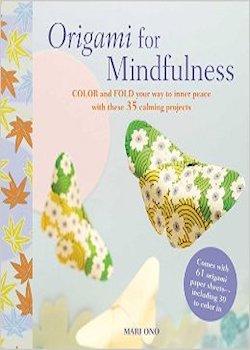Origami for Mindfulness

By Mari Ono
CICO Books, 2016
ISBN-13: 9781782494058
Review by Margaret Russo
I don’t believe that anyone could disagree with the statement that we live busy lives today which can be often stressful. We pack in activities and schedule ourselves to the point that spontaneity or the sheer pleasure of ‘doing nothing’ is a lost art. Technology, meant to make our lives easier, has had the opposite effect. We rely on our phones and tablets for entertainment, information, and yes, once in a while, communication. We are bombarded with information 24/7. We have not evolved as a species to cope with life as it is today. Consequently, apart from stress, we are in turn, angry and tired, and this has led to an unprecedented increase in anxiety and depression across all age groups. So how do we bring ourselves back into balance?
Mindfulness has come into popular culture in recent years but it is a concept which is centuries old. Being mindful is being present – completely present – in the given moment. When you are mindful, you are focused and when you are focused, your mind cannot wander into the past or the future where you have no control. I practice mindfulness, but being human with flaws and frailties, I falter at times. I was therefore delighted to come across Mari Ono’s Origami for Mindfulness.
‘Colour and fold your way to inner peace’
Speaking as an admirer of all things Japanese, I found Mari’s beautiful book a joy for the senses. It is visually exquisite and in opening it to the first pages, you know that you are in for a treat. She discusses the history behind origami and, uniquely, spells out why origami is therapeutic. It releases stress, it relaxes. It requires focus, and Mari goes so far as to suggest it can even have an anti-ageing effect! What origami certainly does is feed our creative juices and with that, brings us joy.
The book comes with origami papers, some of which are to be coloured in. Again, the very act of colouring is calming as it requires concentration. The popularity of adult colouring books on the market today speaks for itself. The book is divided into chapters entitled ‘Love and Hope’, ‘Happiness and Laughter’ (a particular favourite of mine) and ‘Belief and Willingness’. Within each chapter you will find a variety of projects with a difficulty rating of one to three stars. The individual projects are well illustrated with step-by-step instructions. I confess to being a complete origami novice. I opened the book to its first chapter and found the Fusenbako Balloon Box with an ‘easy’ rating. After several minutes, I was left with a piece of paper with a million folds but no box. Determined, and keeping with the box theme, I next selected the Kobako Chocolate Box. Not easy, but a success! I have my lovely little Kobako (without chocolate) box next to me as I write, and I couldn’t be more pleased.
Like so many things in life, origami is a craft to be practiced and perfected over a period of time. It requires complete focus and attention. The joy of creating something beautiful out of a piece of paper is immeasurable. Is this one antidote to our hectic lives? Yes it is. And I do feel calmer.

